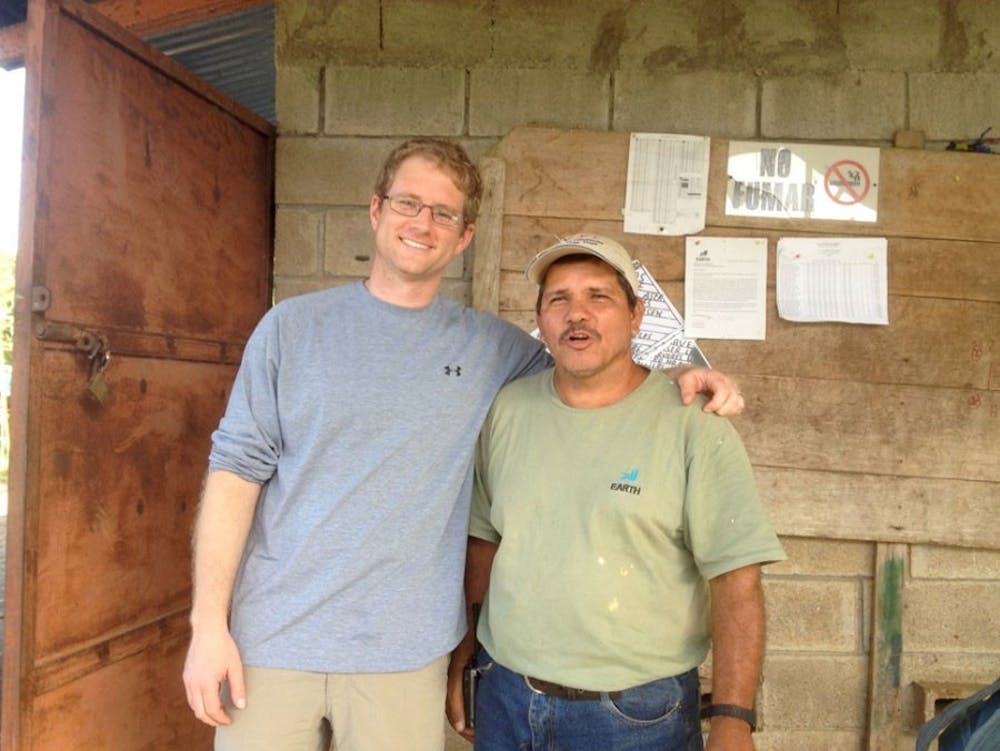[gallery ids="10803,10802,10801"]
By Lindsay Robinson | Echo
Some people use TripAdvisor to plan a vacation, but author and Social Justice Week speaker, Kelsey Timmerman, used the tag on his shirt-a decision that changed his life.
"I followed my Starbucks coffee to Columbia, Dole banana to Costa Rica and apple juice to China," Timmerman said.
The experiences that resulted inspired his books, "Where am I Eating?" and "Where am I Wearing?", in which tells he tells the stories of the people behind the products we buy every day.
Timmerman's journey began after he graduated from Miami University in Ohio with a degree in anthropology. After four years of reading about other places and people, he ached to see the world.
He saved up and took a six-month trip to Australia, Thailand and Nepal, living as cheaply as possible. After that, he worked as a scuba instructor in Key West, Florida, where he wrote about his traveling experiences.
Timmerman's hobby soon turned into an occupation as newspapers and magazines published his articles. He began a routine of saving up money, traveling and writing. While he admits that this way of life was expensive, he loved every second of it.
"In many ways, that was kind of my grad school," Timmerman said.
While thinking about the next place to go, Timmerman remembered one of his favorite t-shirts, a Fantasy Island shirt which said "come with me to my tropical paradise." This shirt inspired him to travel to the country where this shirt was made-which led him to Honduras.
He booked a plane ticket and spent his trip hiking through the jungle, scuba diving and exploring the country. Toward the end of his trip, he decided to visit the factory where his shirt was made. While he knew the likelihood of receiving a tour was slim, he decided to wait outside and see the place and the people who worked there.
"I met a guy who was 25 at the time, and he was about the same age as me," Timmerman said. "Shaking the hand of the guy who essentially made my shirt, just seeing his face and learning the smallest little bits about his life, suddenly it got real that we are connected with the rest of the world and yet we know so little about the people who produce our clothes."
Finding out where his clothes came from turned into an obsession. Looking at the tags of some of his favorite articles of clothing, he decided to go to Cambodia for his Levi's blue jeans, China for his favorite flip-flops and Ethiopia for another pair of shoes. Timmerman chronicled his experiences in his first book, "Where am I Wearing?"
Through conversations with people on his travels, he realized the complexity of consumerism.
"It's not just that all these people are being exploited or this (factory work) is a great opportunity," Timmerman explained. "The truth is usually somewhere in the middle."
Timmerman grew up in Union City, Ohio, a rural area, and loved the country. After learning that most of the factory workers he met overseas were originally farmers, he wondered why they had chosen to leave rural life for a factory job in the city.
To do this, he followed his produce around the world and chronicled those experiences in his book "Where am I Eating?" One of his most impactful experiences happened while visiting the Ivory Coast, following the path of the raw materials found in our Valentine's Day chocolates.
While the problem of child labor in the cocoa industry has been well chronicled by documentaries such as "The Dark Side of Chocolate," he wondered why parents were forced to sell their kids into slavery.
Timmerman found that while Western concern focuses on ways to end child slave labor, it does little to support farmers and their families who are facing problems due to a changing climate and the poor economy. Western help was missing the root of the problem.
While in the Ivory Coast, he met Solo, a modern-day slave. Solo described himself as worse than a donkey, because donkeys are actually fed.
Timmerman hired Solo as his translator and tried to give him a chance to escape the cocoa farm, but was threatened with arrest by the farm's owner, who had formerly been his guide. He was forced to leave, but wrote about it in his book. He still carries a little gold nugget he was given near that farm in his wallet.
"In my travels, I have been to some of the poorest places on the planet . . . they have a poverty of resources but a wealth of community," he said. "In my own life (in the U.S.), I've felt a poverty of community and a relative wealth of resources."
Timmerman stresses the importance of not only being aware of ethical issues around the world and shopping consciously, but also staying involved in your local community.
This thought process led Timmerman to co-found a nonprofit called "The Facing Project" which focuses on strengthening communities in the U.S. through art and storytelling. The non-profit provides a platform for artists to tell the stories of their neighbors through their own artistic medium.
While Timmerman hopes people who hear and read about his experiences will be affected in some way, he knows that he has been impacted the most.
"I've held the cocoa farmers' baby; I've taught grandma how to throw a Frisbee . . . and they've given me their story," Timmerman said. "They've shared their story with me, and I have this responsibility to share it."
Timmerman will be speaking on Wednesday, March 2, at 7 p.m. in Euler 109.



